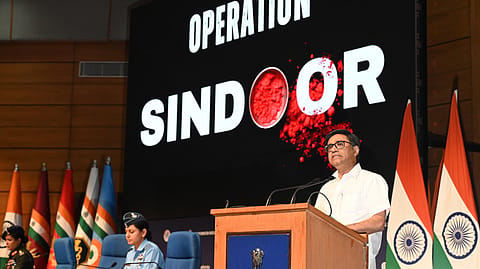'Dangerous message': India on IMF's consideration of bailout package to Pakistan, warns against rewarding terrorism
In a stern message, India has said rewarding continued sponsorship of cross-border terrorism sends a "dangerous message" to the global community, exposes funding agencies and donors to reputational risks, and makes a "mockery" of global values

India has abstained from voting on the International Monetary Fund's (IMF) bailout package for Pakistan, raising serious concerns over its latest review of the $1 billion EFF lending programme and the consideration of a fresh loan worth $1.3 billion to Pakistan, calling it a response "circumscribed by procedural and technical formalities".
In a stern message, India has said rewarding continued sponsorship of cross-border terrorism sends a "dangerous message" to the global community, exposes funding agencies and donors to reputational risks, and makes a "mockery" of global values. The government has termed it a "serious gap", calling for an urgent need to ensure moral values are given "appropriate consideration" before extending such facilities by global institutions like the IMF.
The International Monetary Fund (IMF) today reviewed the EFF lending programme ($1 billion) and also considered a fresh RSF lending programme worth $1.3 billion for Pakistan. "While the concern that fungible inflows from international financial institutions, like the IMF, could be misused for military and state-sponsored cross-border terrorist purposes resonated with several member countries, the IMF response is circumscribed by procedural and technical formalities. This is a serious gap, highlighting the urgent need to ensure that moral values are given appropriate consideration in the procedures followed by global financial institutions," a government statement said.
Notably, India has raised concerns over the efficacy of IMF programmes in the case of Pakistan, given its poor track record, and also on the possibility of "misuse of debt financing funds" for state-sponsored cross-border terrorism.
Pakistan, which has been a prolonged borrower from the IMF, also has a very poor track record of implementation and adherence to the IMF’s programme conditions. In the 35 years since 1989, Pakistan has had disbursements from the IMF in 28 years. In the last 5 years, since 2019, Pakistan has been the beneficiary of 4 IMF programmes.
India, meanwhile, pointed out that such a track record calls into question either the effectiveness of the IMF programme designs in the case of Pakistan or their monitoring or their implementation by Pakistan. "Had the previous programmes succeeded in putting in place a sound macroeconomic policy environment, Pakistan would not have approached the fund for yet another bailout programme," said the government.
Additionally, the Pakistani military’s "deeply entrenched interference" in economic affairs poses significant risks of policy slippages and reversal of reforms, says the government. "Even when a civilian government is in power now, the army continues to play an outsized role in domestic politics and extends its tentacles deep into the economy."
Notably, a 2021 UN report had described military-linked businesses as the “largest conglomerate in Pakistan”. The situation has not changed for the better; rather, the Pakistan Army now plays a leading role in the Special Investment Facilitation Council of Pakistan.
India flagged the Pakistan chapter of the IMF Report on the Evaluation of Prolonged Use of IMF Resources. "The report noted there was a widespread perception that political considerations have an important role to play in the IMF lending to Pakistan. As a result of repeated bailouts, Pakistan’s debt burden is very high, which paradoxically makes it a too-big-to-fail debtor for the IMF."
In yet another provocation, Pakistan, in the intervening night of May 8 and 9, targeted Jammu, Udhampur, and Pathankot with missiles and drones, but the attack was foiled by the Indian Armed Forces, and no major loss was reported. The Pakistani military carried out drone and missile attacks at 36 locations in India, with about 300-400 drones, and used civilian aircraft as a shield to protect its territory, the Indian armed forces said on Friday.
The attack came after India retaliated to drone strikes launched by Pakistan on as many as 15 defence locations in India on Wednesday night. These drone missiles were intercepted and destroyed by India before they could cause any damage. In response, India's armed forces hit critical defence infrastructure in Pakistan, including the air defence system in Lahore.
(INR CR)
The Indian Armed Forces had launched “Operation Sindoor” in the early hours of May 7, 2025, to hit terrorist infrastructure in Pakistan and Pakistan-occupied Jammu and Kashmir, from where terrorist attacks against India have been planned and directed. This comes in the wake of the barbaric Pahalgam terrorist attack in which 25 Indians and one Nepali citizen were murdered.